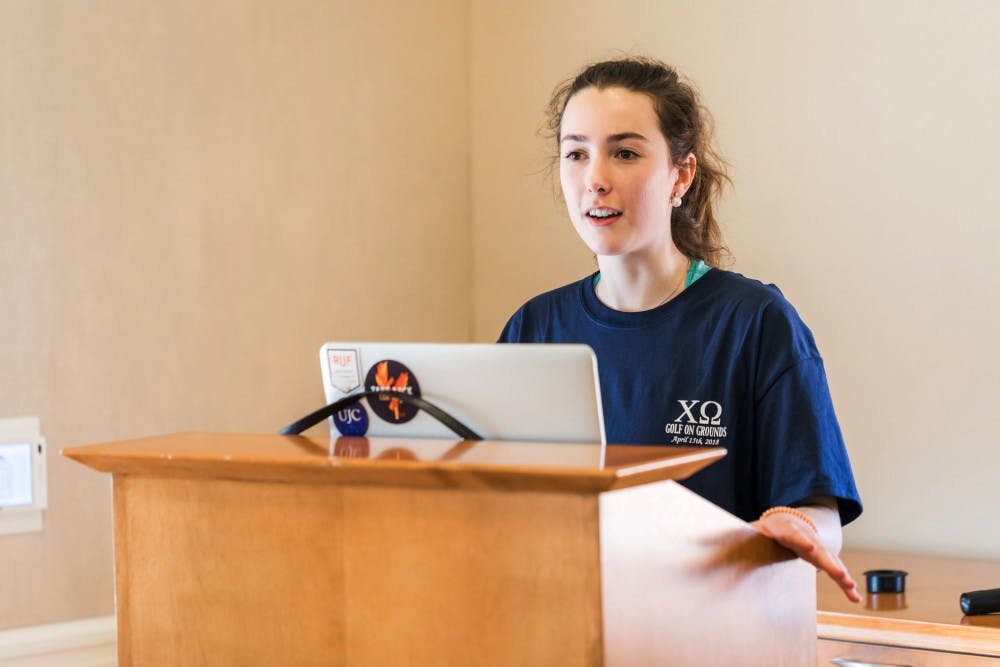Take Back the Night hosted an event titled “Love Shouldn’t Hurt” Wednesday, which focused on intimate partner violence and abuse. The event featured speakers from the Maxine Platzer Lynn Women’s Center, the Shelter for Help in Emergency, Green Dot, One in Four and the One Love Foundation — all of which are organizations committed to stopping sexual assault and partner violence.
Take Back the Night is an internationally recognized event that aims to end sexual assault in all of its forms through activities and initiatives that raise awareness. “Love Shouldn’t Hurt” was part a series of events held at the University this year throughout the month of April. Earlier in the month, Take Back the Night hosted a vigil for survivors of sexual assault and an event recognizing sexual assault in the LGBTQ community.
Many of the speakers chose to speak about marginalized groups that are equally as affected by partner violence, but less visible. Gabrielle Woolley, a second-year College student and member of Take Back the Night, said that was an objective of Take Back the Night this year.
“One of the goals for Take Back the Night this year was to be more aware of intersectionality and all of the marginalized communities that aren't typically included in dialogue about partner violence,” Wooley said. “I think all of the speakers were very inclusive and considerate of this.”
In an email to The Cavalier Daily, Sarah Nolan, a second-year College student and chair of “Love Shouldn’t Hurt,” spoke about the group’s goals for their specific event with in the University community.
“The Love Shouldn’t Hurt event was created to spread awareness of the domestic violence and unhealthy relationships that are a part of the sexual assault sphere,” Nolan said. “We wanted to focus on relationships at UVA and how people can see the signs of someone struggling with this type of relationship or how a person can reach out to resources themselves.”
Nolan said hoped students would gain tools at the event to use on Grounds in their daily lives.
“I hope that the attendees walked away with at least the knowledge of how to spot a friend in need and where they can get help if they need,” she said. “Relationship violence comes in many forms, not just physical abuse, and I believe that many students overlook this.”
Claire Kaplan, director of the Gender Violence and Social Change Program at the Women’s Center, emphasized the importance of awareness events like this, saying that “students are more focused on sexual assault and don’t think as much about abusive relationships.”
There are many support resources at the Women’s Center, Kaplan said. Counseling and confidential advocates are available, and Kaplan herself teaches a University course in the Fall titled “Gender Violence and Social Justice.” She encouraged attendees to go through survivor support network training to better help peers who have gone through similar situations.
Nicole Moss, an ODOS Violence Prevention intern and graduate Education student, talked about what to do if you see a friend or stranger exhibiting warning signs of abuse. “Direct, distract, and delegate” are the “Three D’s,” Green Dot recommends using to avoid negative situations and to be an active bystander.
“Everyone has barriers in intervening, but you can always do something,” she said.
Third-year Engineering student Matt Gummersbach provided a male perspective for the audience. As a member of One in Four, Gummersbach gives presentations to male identifiers and mixed groups about how men can get involved in the conversation of sexual assault and relationship violence.
“If we want to change the culture surrounding this we have to engage men,” Gummersbach said.
One in Four speaks about consent, bystander intervention and survivor support, as well as steps that can be taken to prevent partner violence. The group’s event, “Dorm Norms,” aims to educate first-year students about the dangers of an unhealthy relationship.
“A lot of times first years may have long distance relationships for the first time or are having new kinds of relationships than they had in high school,” Gummersbach said.
Charlotte Gemes, a fourth-year College student and president of the University chapter of the One Love Foundation was also present, along with first-year College student and member Martha Gallagher. One Love was founded in 2010 after the murder of University student Yeardley Love by her ex-boyfriend.
The students presented the One Love “Escalation” workshop, featuring a video entitled “Behind the Post” on the escalation of a couple’s relationship into emotional partner violence and the social media that masked it.
The final presentation of the evening was given by a member of the Shelter for Help in Emergency, Elizabeth Uffelman. The shelter offers many resources to victims of domestic violence, including a 24-hour hotline, safety planning, supportive counseling, an emergency shelter and legal advocacy.
“Intimate partner violence doesn’t discriminate,” Uffelman said.
Uffelman also spoke about the effect that media has on normalizing abusive relationships.
“We need more films and movies that challenge cultural norms rather than reinforcing them,” Uffelman said. “Not every portrayal is accurate.”







